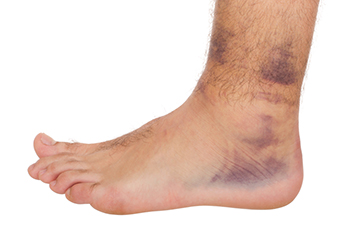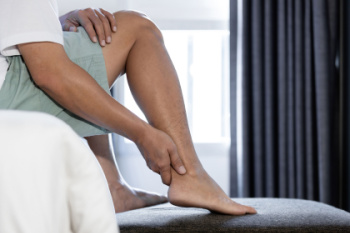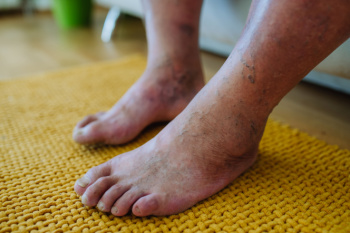Items filtered by date: May 2024
Ankle Sprains and Peripheral Nerve Damage
 Ankle sprains, while commonly known for affecting ligaments, can also lead to peripheral nerve damage when the injury is severe. Peripheral nerve damage can occur when the nerves around the ankle are stretched, compressed, or torn during the sprain. Symptoms of peripheral nerve damage from an ankle sprain include tingling, numbness, or a burning sensation in the foot or along the ankle. Some patients might also experience a sensation of “pins and needles.” They may also have a lowered ability to feel touch, pain, or temperature changes. Severe cases can result in a limited ability to walk due to muscle weakness. Proper diagnosis and treatment are important to manage symptoms effectively. A podiatrist, or foot doctor, can use tools like nerve conduction studies to assess the extent of nerve damage. They may suggest various treatments, including targeted stretching techniques to strengthen and restore function and medications that help manage pain and nerve symptoms. To alleviate pain and minimize the risk of chronic ankle pain, it is suggested that you consult a podiatrist for treatment options.
Ankle sprains, while commonly known for affecting ligaments, can also lead to peripheral nerve damage when the injury is severe. Peripheral nerve damage can occur when the nerves around the ankle are stretched, compressed, or torn during the sprain. Symptoms of peripheral nerve damage from an ankle sprain include tingling, numbness, or a burning sensation in the foot or along the ankle. Some patients might also experience a sensation of “pins and needles.” They may also have a lowered ability to feel touch, pain, or temperature changes. Severe cases can result in a limited ability to walk due to muscle weakness. Proper diagnosis and treatment are important to manage symptoms effectively. A podiatrist, or foot doctor, can use tools like nerve conduction studies to assess the extent of nerve damage. They may suggest various treatments, including targeted stretching techniques to strengthen and restore function and medications that help manage pain and nerve symptoms. To alleviate pain and minimize the risk of chronic ankle pain, it is suggested that you consult a podiatrist for treatment options.
Ankle sprains are common but need immediate attention. If you need your feet checked, contact Gabrielle Clark, DPM from LA Feet Foot & Ankle Center, Inc. Our doctor can provide the care you need to keep you pain-free and on your feet.
How Does an Ankle Sprain Occur?
Ankle sprains take place when the ligaments in your ankle are torn or stretched beyond their limits. There are multiple ways that the ankle can become injured, including twisting or rolling over onto your ankle, putting undue stress on it, or causing trauma to the ankle itself.
What Are the Symptoms?
- Mild to moderate bruising
- Limited mobility
- Swelling
- Discoloration of the skin (depending on severity)
Preventing a Sprain
- Wearing appropriate shoes for the occasion
- Stretching before exercises and sports
- Knowing your limits
Treatment of a Sprain
Treatment of a sprain depends on the severity. Many times, people are told to rest and remain off their feet completely, while others are given an air cast. If the sprain is very severe, surgery may be required.
If you have suffered an ankle sprain previously, you may want to consider additional support such as a brace and regular exercises to strengthen the ankle.
If you have any questions please feel free to contact our offices located in New Orleans, and Metairie, LA . We offer the newest diagnostic and treatment technologies for all your foot and ankle needs.
Rheumatoid Arthritis and Foot Health
 Rheumatoid arthritis, or RA, is an autoimmune disease that causes inflammation in the joints. In RA, the immune system mistakenly attacks the lining of the joints, causing swelling, pain, and potentially severe joint damage. This can cause problems in any of the 30 foot joints, but it most commonly affects the toes and ankles. RA can also lead to deformities such as bunions, claw toes, or severe flattening of the foot, as well as pain and difficulty walking. Chronic inflammation can weaken the ligaments and tendons in the foot, leading to instability and increased risk of injury. Podiatrists, or foot doctors, can help manage RA-related foot issues by providing targeted treatments. Among them are orthotics to support the joints, advice on proper footwear to reduce stress on the affected areas, and exercises to maintain joint function and mobility. They also monitor for changes or deterioration in foot health that might require more aggressive interventions, including injections or surgery. If you’re a rheumatoid arthritis patient with problems in the feet and ankles, it is suggested that you add a podiatrist to your care team.
Rheumatoid arthritis, or RA, is an autoimmune disease that causes inflammation in the joints. In RA, the immune system mistakenly attacks the lining of the joints, causing swelling, pain, and potentially severe joint damage. This can cause problems in any of the 30 foot joints, but it most commonly affects the toes and ankles. RA can also lead to deformities such as bunions, claw toes, or severe flattening of the foot, as well as pain and difficulty walking. Chronic inflammation can weaken the ligaments and tendons in the foot, leading to instability and increased risk of injury. Podiatrists, or foot doctors, can help manage RA-related foot issues by providing targeted treatments. Among them are orthotics to support the joints, advice on proper footwear to reduce stress on the affected areas, and exercises to maintain joint function and mobility. They also monitor for changes or deterioration in foot health that might require more aggressive interventions, including injections or surgery. If you’re a rheumatoid arthritis patient with problems in the feet and ankles, it is suggested that you add a podiatrist to your care team.
Because RA affects more than just your joints, including the joints in your feet and ankles, it is important to seek early diagnosis from your podiatrist if you feel like the pain in your feet might be caused by RA. For more information, contact Gabrielle Clark, DPM of LA Feet Foot & Ankle Center, Inc. Our doctor will assist you with all of your podiatric concerns.
What Is Rheumatoid Arthritis?
Rheumatoid Arthritis (RA) is an autoimmune disorder in which the body’s own immune system attacks the membranes surrounding the joints. Inflammation of the lining and eventually the destruction of the joint’s cartilage and bone occur, causing severe pain and immobility.
Rheumatoid Arthritis of the Feet
Although RA usually attacks multiple bones and joints throughout the entire body, almost 90 percent of cases result in pain in the foot or ankle area.
Symptoms
- Swelling and pain in the feet
- Stiffness in the feet
- Pain on the ball or sole of feet
- Joint shift and deformation
Diagnosis
Quick diagnosis of RA in the feet is important so that the podiatrist can treat the area effectively. Your doctor will ask you about your medical history, occupation, and lifestyle to determine the origin of the condition. Rheumatoid Factor tests help to determine if someone is affected by the disease.
If you have any questions please feel free to contact our offices located in New Orleans, and Metairie, LA . We offer the newest diagnostic and treatment technologies for all your foot and ankle needs.
Understanding an Achilles Tendon Tear

An Achilles tendon tear occurs when the fibrous tissue connecting the calf muscles to the heel bone ruptures, often due to sudden and forceful movements or overuse. This vital tendon plays an essential role in everyday activities such as walking, running, and jumping. When torn, it can cause severe pain, swelling, and difficulty walking. The injury is commonly associated with athletes, especially those involved in sports requiring quick bursts of acceleration like basketball or soccer. However, anyone can experience an Achilles tendon tear, particularly as they age or if they engage in activities that strain the tendon. Treatment typically involves rest and stretching exercises that can strengthen the tendon and prevent future injuries. In severe cases, surgical intervention may be necessary to repair the tear. If you have endured an Achilles tendon injury, it is suggested that you visit a podiatrist who can accurately diagnose and treat this condition.
Achilles tendon injuries need immediate attention to avoid future complications. If you have any concerns, contact Gabrielle Clark, DPM of LA Feet Foot & Ankle Center, Inc. Our doctor can provide the care you need to keep you pain-free and on your feet.
What Is the Achilles Tendon?
The Achilles tendon is a tendon that connects the lower leg muscles and calf to the heel of the foot. It is the strongest tendon in the human body and is essential for making movement possible. Because this tendon is such an integral part of the body, any injuries to it can create immense difficulties and should immediately be presented to a doctor.
What Are the Symptoms of an Achilles Tendon Injury?
There are various types of injuries that can affect the Achilles tendon. The two most common injuries are Achilles tendinitis and ruptures of the tendon.
Achilles Tendinitis Symptoms
- Inflammation
- Dull to severe pain
- Increased blood flow to the tendon
- Thickening of the tendon
Rupture Symptoms
- Extreme pain and swelling in the foot
- Total immobility
Treatment and Prevention
Achilles tendon injuries are diagnosed by a thorough physical evaluation, which can include an MRI. Treatment involves rest, physical therapy, and in some cases, surgery. However, various preventative measures can be taken to avoid these injuries, such as:
- Thorough stretching of the tendon before and after exercise
- Strengthening exercises like calf raises, squats, leg curls, leg extensions, leg raises, lunges, and leg presses
If you have any questions please feel free to contact our offices located in New Orleans, and Metairie, LA . We offer the newest diagnostic tools and technology to treat your foot and ankle needs.
The Importance of Diabetic Foot Care

Diabetic foot care is paramount for preserving limb health and preventing serious complications. Diabetes can lead to various foot issues, including neuropathy, microvascular disease, foot ulcers, and biomechanical changes. Neuropathy diminishes sensation, increasing the risk of unnoticed injuries, while microvascular disease impairs circulation, slowing wound healing. Foot ulcers may develop possibly leading to infections and even amputation if left untreated. Biomechanical changes further exacerbate pressure points, contributing to ulcer formation. Regular foot examinations, meticulous hygiene, proper footwear, and prompt treatment of any foot abnormalities are crucial in diabetic foot care. Podiatrists specialize in assessing diabetic foot health, providing preventive care, and offering tailored treatments to minimize complications, ensuring optimal limb preservation and overall well-being. If you have diabetes, it is strongly suggested that you include a podiatrist on your healthcare team.
Diabetic foot care is important in preventing foot ailments such as ulcers. If you are suffering from diabetes or have any other concerns about your feet, contact Gabrielle Clark, DPM from LA Feet Foot & Ankle Center, Inc. Our doctor can provide the care you need to keep you pain-free and on your feet.
Diabetic Foot Care
Diabetes affects millions of people every year. The condition can damage blood vessels in many parts of the body, especially the feet. Because of this, taking care of your feet is essential if you have diabetes, and having a podiatrist help monitor your foot health is highly recommended.
The Importance of Caring for Your Feet
- Routinely inspect your feet for bruises or sores.
- Wear socks that fit your feet comfortably.
- Wear comfortable shoes that provide adequate support.
Patients with diabetes should have their doctor monitor their blood levels, as blood sugar levels play such a huge role in diabetic care. Monitoring these levels on a regular basis is highly advised.
It is always best to inform your healthcare professional of any concerns you may have regarding your feet, especially for diabetic patients. Early treatment and routine foot examinations are keys to maintaining proper health, especially because severe complications can arise if proper treatment is not applied.
If you have any questions please feel free to contact our offices located in New Orleans, and Metairie, LA . We offer the newest diagnostic and treatment technologies for all your foot and ankle needs.

